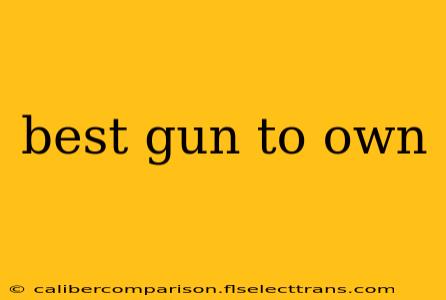Finding the Best Gun for You: A Comprehensive Guide
Choosing the "best" gun is highly subjective and depends entirely on your individual needs and circumstances. There's no single answer, as the ideal firearm varies drastically depending on intended use, experience level, and legal considerations. This guide will help you navigate the complexities of firearm selection, ensuring you make an informed and responsible decision.
Disclaimer: This information is for educational purposes only. Always check and comply with all local, state, and federal laws regarding firearm ownership and use. Safe gun handling practices are paramount. Seek professional training before handling any firearm.
Defining Your Needs: The Foundation of Your Choice
Before diving into specific models, honestly assess your reasons for wanting a firearm. This is crucial for selecting the right type and caliber.
1. Self-Defense: If self-defense is your primary concern, you'll want a firearm that is easy to handle, reliable, and suitable for close-quarters situations. Common choices include handguns like semi-automatic pistols (9mm, .40 S&W, or .45 ACP are popular calibers) or revolvers. Consider factors like size, weight, ease of concealment, and your physical capabilities.
2. Home Defense: Home defense requires a different approach. Shotguns and carbines (short-barreled rifles) are often favored for their stopping power and ability to penetrate barriers. However, the potential for overpenetration is a critical concern, requiring careful consideration of your living environment and surrounding areas.
3. Hunting: Hunting firearms vary significantly depending on the game you intend to hunt. Rifles are common for larger game, while shotguns are suitable for smaller game and waterfowl. Caliber selection is crucial, as it affects range, accuracy, and the ethical harvest of animals. Research regulations and ethical hunting practices thoroughly.
4. Sport Shooting: If your goal is target practice or competitive shooting, your options expand considerably. Pistols, rifles, and shotguns are all viable choices, with caliber and features dictated by the specific discipline. Consider factors like accuracy, ergonomics, and the type of ammunition used in your chosen sport.
5. Collecting: Firearm collecting is a passion for many, with a focus on historical significance, rarity, or aesthetic appeal. The "best" gun for collecting is entirely subjective, depending on your personal preferences and collecting goals.
Key Factors to Consider When Choosing a Firearm
Beyond the intended use, several key factors influence the choice of firearm:
- Caliber: The caliber refers to the diameter of the bullet. Larger calibers generally have greater stopping power but often produce more recoil.
- Action Type: This refers to how the firearm operates (e.g., semi-automatic, revolver, pump-action, bolt-action). Each type has advantages and disadvantages in terms of reliability, capacity, and ease of use.
- Reliability: A firearm's reliability is paramount. Choose a well-respected brand with a history of producing durable and dependable firearms.
- Ergonomics: The firearm should feel comfortable and intuitive in your hand. Consider factors like grip size, weight, and trigger pull.
- Cost: Firearm prices vary significantly. Set a realistic budget and stick to it.
- Maintenance: Regular cleaning and maintenance are essential for firearm longevity and reliability. Consider the ease of maintenance before purchasing.
Responsible Gun Ownership: A Lifelong Commitment
Owning a firearm is a significant responsibility. It requires ongoing commitment to safe storage, proper handling, and continuous learning. Never hesitate to seek professional training from qualified instructors. Your safety and the safety of others depend on it. Remember, the "best" gun is the one you handle safely and responsibly.

